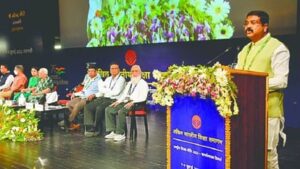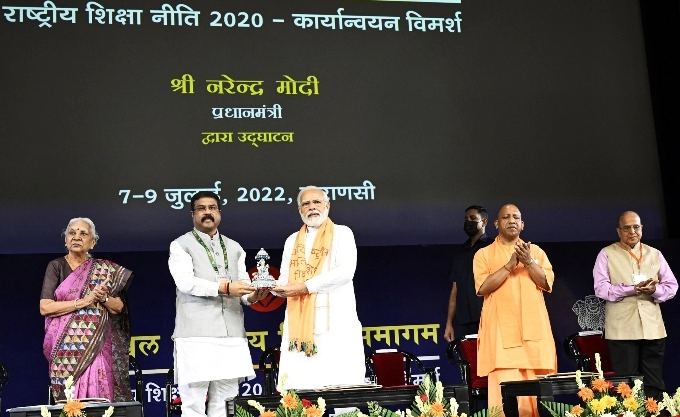IndiGlobal Media
 The Akhil Bhartiya Shiksha Samagam witnessed 11 sessions including 9 thematic session and two exclusive sessions on sharing success stories and best practices of for implementation of NEP 2020. The deliberations ranged from themes like holistic and multidisciplinary education, enhancing quality, inclusivity and access by use of technology, to the need for promoting an ecosystem for research and innovation, to promotion of Indian languages, Indian Knowledge Systems.
The Akhil Bhartiya Shiksha Samagam witnessed 11 sessions including 9 thematic session and two exclusive sessions on sharing success stories and best practices of for implementation of NEP 2020. The deliberations ranged from themes like holistic and multidisciplinary education, enhancing quality, inclusivity and access by use of technology, to the need for promoting an ecosystem for research and innovation, to promotion of Indian languages, Indian Knowledge Systems.
The first thematic session was on Multidisciplinary and Holistic Education and was chaired by Dr. Prof. Rama Shanker Dubey Vice-Chancellor, Central University Gujarat, Gandhinagar. Dr. Rishikesha T. Krishnan Director, Indian Institute of Management, Bengaluru; Prof. Raj Singh Vice-Chancellor Jain University, Bangalore; Prof. Nitin Karmalkar Former Vice-Chancellor, Savitribai Phule Pune University, Pune and Prof. S. P. Bansal Vice-Chancellor, Central University of Himachal Pradesh were the panelist for the session. It was suggested that higher educational institutions impart holistic education to the students by becoming multidisciplinary in nature by floating baskets of multidisciplinary courses.
The second thematic session was on Research, Innovation and Entrepreneurship and was chaired by Prof. G. Rangarajan, Director, IISc, Bangalore. Prof. V. K. Tiwari, Director, Indian Institute of Technology (IIT), Kharagpur; Prof. C. Muthamizh Chelvan Vice- Chancellor, SRM Institute of Science & Technology, Chennai; Dr. Shrinivas Balli Vice- Chancellor, Nrupathunga University, Bangalore and Prof. K. R. S. Sambasiva Rao, Vice- Chancellor, Central University of Mizoram were the panelist for the session. In-depth understanding of research and innovation methodologies and critical thinking abilities with emphasis on out-of-the-box thinking, creating multidisciplinary interconnected centres of excellence as drivers of research, innovation, and entrepreneurship, with close links to the society and economy were discussed.
 The third thematic session was on Governance and Capacity Building of Teachers for Quality Education. Prof. M. K. Sridhar, Member, Drafting Committee of NEP staired the session. The panelist who deliberated on the theme were: Prof. Avinash C. Pandey, Director, IUAC, Delhi; Prof. (Dr.) Vijay Kumar Srivastava Vice-Chancellor, Maharaja Sayajirao University of Baroda, Vadodara, Gujarat; Prof. Dinesh Prasad Saklani Chairperson, NCTE and Prof. Sanjeev Jain, Vice-Chancellor, Central University of Jammu. It was felt that the entire structure of the teacher-education programmes needs to be revamped by making it an integral part of the broader higher education. Teachers should come up with new courses every year so that students have better choices in courses. The teacher should be provided an opportunity to work on a patent and if the product is sustainable in the market, then the university would also support for the startup and if required then the teacher can come back to the academic career.
The third thematic session was on Governance and Capacity Building of Teachers for Quality Education. Prof. M. K. Sridhar, Member, Drafting Committee of NEP staired the session. The panelist who deliberated on the theme were: Prof. Avinash C. Pandey, Director, IUAC, Delhi; Prof. (Dr.) Vijay Kumar Srivastava Vice-Chancellor, Maharaja Sayajirao University of Baroda, Vadodara, Gujarat; Prof. Dinesh Prasad Saklani Chairperson, NCTE and Prof. Sanjeev Jain, Vice-Chancellor, Central University of Jammu. It was felt that the entire structure of the teacher-education programmes needs to be revamped by making it an integral part of the broader higher education. Teachers should come up with new courses every year so that students have better choices in courses. The teacher should be provided an opportunity to work on a patent and if the product is sustainable in the market, then the university would also support for the startup and if required then the teacher can come back to the academic career.
The fourth thematic session was on Quality, Ranking and Accreditation. The panelists for the session were: Prof. G. Hemanth Kumar Vice-Chancellor, University of Mysore, Mysore; Dr. R. M. Kathiresan Vice-Chancellor, Annamalai University; Prof. Dr. S. Vaidhyasubramaniam, Vice-Chancellor, SASTRA, Thanjavur and Prof. R. P. Tiwari Vice-Chancellor, Central University of Punjab. The deliberation was held under the chairmanship of Prof. K. K. Aggarwal, Chairman, National Board Accreditation (NBA), New Delhi. Following were discussed during the session-Steps needed to attain higher ranks in the world-renowned rankings such as the Times Higher Education and QS World University Rankings, Colleges to be encouraged, mentored, supported, and incentivized to gradually attain the minimum benchmarks required for each level of accreditation, explore ways to bring the vast majority of non-accredited institutions under the ambit of the accreditation framework.
The fifth thematic session was on Digital Empowerment and Online Education. Prof. Kamakoti Veezhinathan, Director, Indian Institute of Technology, Madras; Prof. P. V. Vijayaraghavan Vice Chancellor, Sri Ramchandra Institute of Higher Education and Research,Chennai; Shri Rahul Kulkarni, Chief Technologist, Samagra & Co-Founder, DoNew ; Prof. Nageshwar Rao Vice-Chancellor, IGNOU were the panelist in the discussion. The deliberation was held under the chairmanship of Prof. Anil D. Sahasrabudhe Chairman, AICTE. Panelists exchanged views on optimization of existing digital platforms and ongoing ICT-based educational initiatives to meet the current and future challenges in higher education, creating better learning opportunities using digital resources for a wider audience, on affordable and equitable basis with lifelong learning orientation, need to have nationwide mentoring centres with industry supported labs in various areas.
 The sixth thematic session was on Equitable and Inclusive Education. The session was chaired by Prof. Syed Ainul Hasan Vice-Chancellor, Maulana Azad National Urdu University, Hyderabad. The panelist for the session were Prof. T. V. Kattimani Vice- Chancellor, Central Tribal University, Andhra Pradesh, Vijayanagaram; Dr. Ujwala Chakradeo Vice-Chancellor, SNDT Women’s University, Mumbai; Prof. Santishree Dhulipudi Pandit Vice-Chancellor, Jawaharlal Nehru University, Delhi and Prof. Sushma Yadav Commission Member, UGC & Former Vice-Chancellor, Bhagat Phool Singh Mahila Vishwavidyalay. Following were discussed during the session-Equitable access to quality education for all students, with special emphasis on Socio-Economically Disadvantaged Groups (SEDGs) to promote equity and inclusion in higher education, improving equitable access to Quality Education for the Socio-Economically Disadvantaged Groups (SEDGs) through Bridge Courses, Earn-While-Learn programmes and Outreach initiatives, bringing in more opportunities for scholarships, fellowships, and research with an open spirit of participation and competition.
The sixth thematic session was on Equitable and Inclusive Education. The session was chaired by Prof. Syed Ainul Hasan Vice-Chancellor, Maulana Azad National Urdu University, Hyderabad. The panelist for the session were Prof. T. V. Kattimani Vice- Chancellor, Central Tribal University, Andhra Pradesh, Vijayanagaram; Dr. Ujwala Chakradeo Vice-Chancellor, SNDT Women’s University, Mumbai; Prof. Santishree Dhulipudi Pandit Vice-Chancellor, Jawaharlal Nehru University, Delhi and Prof. Sushma Yadav Commission Member, UGC & Former Vice-Chancellor, Bhagat Phool Singh Mahila Vishwavidyalay. Following were discussed during the session-Equitable access to quality education for all students, with special emphasis on Socio-Economically Disadvantaged Groups (SEDGs) to promote equity and inclusion in higher education, improving equitable access to Quality Education for the Socio-Economically Disadvantaged Groups (SEDGs) through Bridge Courses, Earn-While-Learn programmes and Outreach initiatives, bringing in more opportunities for scholarships, fellowships, and research with an open spirit of participation and competition.
The seventh thematic session was held on the theme “Promotion of Indian Languages and Indian Knowledge Systems”. Prof. Chamu Krishna Shastri, Chairman, HPC for Promotion of Indian Languages staired the panel discussion. Prof Ganti Suryanarayan Murthy Coordinator, Indian Knowledge Systems (IKS); Swami Sarvottamananda Vice-Chancellor, Ramakrishna Mission Vivekananda Educational and Research Institute, Belur Math and Prof. Radhakant Thakur Vice-Chancellor, Rashtriya Sanskrit Vidyapeetha, Tirupati being the panelist, deliberated on the mentioned themes-development of ways and means to preserve, strengthen, and promote the rich cultural heritage, art, and languages of India, incorporating Indian Knowledge Systems (IKS) into curriculum at all levels, to establish IKS Centres in various institutions across the country to develop institutional capacity to support the research, education, mentoring, and outreach activities.
The first thematic session of day 3 and ninth in the series was held on the theme Skill Development and Employability. Dr. K. N. Satyanarayana Director, Indian Institute of Technology (IIT), Tirupati chaired the session and panel discussion was carried out by Dr. N. S. Kalsi Chairperson, NCVET; Prof. M.P. Poonia Vice Chairman, AICTE, New Delhi; Prof. Raj Nehru, Vice Chancellor, Vishwakarma Skill Development University, Haryana and Prof. Prem Kumar Kalra, Director, Dayalbagh University, Agra.
The tenth thematic session was held on the theme “Internationalization of Education” and the panel discussion was staired by Prof Sudhir Jain, Vice Chancellor, BHU, Varanasi. The panellist for the session who deliberated on the theme were Prof. Vidya Yeravdekar Pro- Chancellor, Symbiosis, Pune; Prof. Anand Agrawal Vice-Chancellor, Chandigarh University, Ajitgarh, Punjab; Prof. (Dr.) C. Raj Kumar Vice-Chancellor, O. P. Jindal University, Sonipat and Dr. Archana Mantri Vice-Chancellor, Chitkara University, Punjab.
Shiksha Samagam provided a platform for eminent academicians, policymakers and academic leaders to deliberate and share their experiences and discuss the roadmap for effective implementation of the National Education Policy (NEP) 2020. The event was attended by more than 300 Academic, Administrative & Institutional Leaders from Universities (Central, State, Deemed, and Private), and Institutes of National Importance (IIT, IIM, NIT, IISER) from all over the country.








